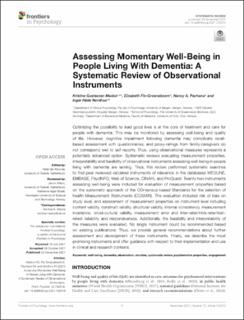| dc.contributor.author | Madsø, Kristine Gustavsen | |
| dc.contributor.author | Flo-Groeneboom, Elisabeth | |
| dc.contributor.author | Pachana, Nancy A. | |
| dc.contributor.author | Nordhus, Inger Hilde Norunn Gjøsæther | |
| dc.date.accessioned | 2021-12-14T13:58:47Z | |
| dc.date.available | 2021-12-14T13:58:47Z | |
| dc.date.created | 2021-12-03T10:16:16Z | |
| dc.date.issued | 2021-11-23 | |
| dc.identifier.issn | 1664-1078 | |
| dc.identifier.uri | https://hdl.handle.net/11250/2834239 | |
| dc.description.abstract | Optimizing the possibility to lead good lives is at the core of treatment and care for people with dementia. This may be monitored by assessing well-being and quality of life. However, cognitive impairment following dementia may complicate recall-based assessment with questionnaires, and proxy-ratings from family-caregivers do not correspond well to self-reports. Thus, using observational measures represents a potentially advanced option. Systematic reviews evaluating measurement properties, interpretability and feasibility of observational instruments assessing well-being in people living with dementia are lacking. Thus, this review performed systematic searches to find peer reviewed validated instruments of relevance in the databases MEDLINE, EMBASE, PsycINFO, Web of Science, CINAHL and ProQuest. Twenty-two instruments assessing well-being were included for evaluation of measurement properties based on the systematic approach of the COnsensus-based Standards for the selection of health Measurement INstruments (COSMIN). The evaluation included risk of bias on study level, and assessment of measurement properties on instrument level including content validity, construct validity, structural validity, internal consistency, measurement invariance, cross-cultural validity, measurement error and inter-rater/intra-rater/test–retest reliability and responsiveness. Additionally, the feasibility and interpretability of the measures were evaluated. No single instrument could be recommended based on existing publications. Thus, we provide general recommendations about further assessment and development of these instruments. Finally, we describe the most promising instruments and offer guidance with respect to their implementation and use in clinical and research contexts. | en_US |
| dc.language.iso | eng | en_US |
| dc.publisher | Frontiers | en_US |
| dc.rights | Navngivelse 4.0 Internasjonal | * |
| dc.rights.uri | http://creativecommons.org/licenses/by/4.0/deed.no | * |
| dc.title | Assessing Momentary Well-Being in People Living With Dementia: A Systematic Review of Observational Instruments | en_US |
| dc.type | Journal article | en_US |
| dc.type | Peer reviewed | en_US |
| dc.description.version | publishedVersion | en_US |
| dc.rights.holder | Copyright 2021 the authors | en_US |
| dc.source.articlenumber | 742510 | en_US |
| cristin.ispublished | true | |
| cristin.fulltext | original | |
| cristin.qualitycode | 1 | |
| dc.identifier.doi | 10.3389/fpsyg.2021.742510 | |
| dc.identifier.cristin | 1964040 | |
| dc.source.journal | Frontiers in Psychology | en_US |
| dc.identifier.citation | Frontiers in Psychology. 2021, 12, 742510. | en_US |
| dc.source.volume | 12 | en_US |

